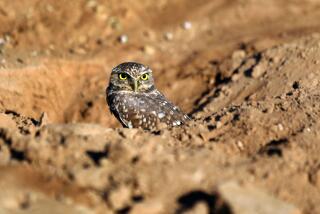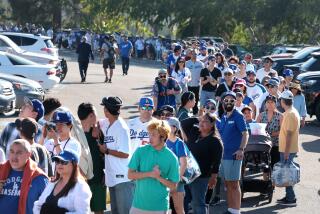His Goal Line These Days Is a Plea to Help Animals
- Share via
Al Hoish returned a kickoff 103 yards for a touchdown in the 1947 Rose Bowl when Hoish was a halfback for UCLA. It still stands as a Rose Bowl record, Hoish admits when prodded.
But you must drag this information from him. He is not interested in talking about his college football and track exploits. Hoish isn’t even much into bragging about flying fighter planes over Burma during World War II.
Instead Hoish, a fit, trim 76-year-old who plays handball three days a week and bridge whenever he can, is speaking passionately about a Siberian tiger named Drifter, a Bengal tiger named Jodi, about the wolves and grizzlies and black bears, the jaguars and parrots and leopards, the lions and baboons and chimps that have been given well appointed homes at the Wildlife Waystation in the gorgeous Angeles National Forest at the base of the San Gabriel Mountains.
These animals, which are often dropped off by owners who thought it would be cool to have a pet mountain lion, or by police who seize a tiger that might be guarding a drug hide-out, are provided clean living quarters, plenty of food and a horde of eager volunteers who clean cages, haul feed and help exercise the animals. But the Wildlife Waystation has trouble providing the most basic item.
Water.
There is none at the Wildlife Waystation and this is where Hoish, the shifty 140-pound left halfback from UCLA, comes in.
It is this lack of water and his quest to find a source, that persuades Hoish to speak at all about himself.
One of his bridge partners had sent an e-mail. Ken Kvammen writes that Hoish “had been a childhood hero of mine, the catalyst of which had been that spectacular 103-yard run [his helmet actually came off in the pounding, dodging and weaving].”
But more than his football heroics, Kvammen continues, Hoish “has dedicated his retirement years to the Wildlife Waystation which cares for abandoned/impaired animals large and small. The station is in Tujunga Canyon with a very meager water supply. . . . The station is forced to truck in more and more water at tremendous expense.”
True, Hoish says, and it is why he wants the city of Los Angeles to put a water line up to the station. Hoish will only speak about himself with the understanding that his story is the secondary story.
“We have to truck in all the water from five miles away,” he says, raising his voice to talk over the squealing of the parrots and the screeching of the peacocks that have the run of the place. Volunteers make 15 or 20 trips a day up and down the winding road to the nearest source of water.
After leaving UCLA and deciding immediately not to answer letters from the Rams and the Bears--”That wasn’t the life I wanted,” Hoish says--he went into the textile business, and into the business of raising sons Tom and John with his wife, Rita.
About 10 years ago, just as he was getting ready to retire, Hoish went to a chili cook-off at the station. He has no memories of the chili. Maybe he didn’t eat any, for he immediately fell in love with the animals and the station.
“I told my wife that this is what I want to do in retirement,” he says. “Help this place.”
For some years Hoish cleaned cages, but a bad back has forced him into less strenuous duties. Now he is what he calls “a schlepper.”
With his own money, Hoish bought a trailer and with his 1991 four-wheel drive vehicle, drives all over the state, picking up donated food, furniture, equipment, sometimes even animals.
“Whatever is needed,” Hoish says.
And he has also made it his job to quietly try to convince city and state officials of the importance of extending a water line five miles into the forest.
“If there’s ever a fire up here, it will be a disaster,” he says. “What would happen to the animals? We’d have to put them down, I imagine.”
During a tour of the facility, Hoish stays back to whisper to a cougar or to laugh with a pair of grizzly bears whose mother was shot when they were cubs in Montana. A farmer, unaware of the cubs, had been frightened when the mother bear came onto his property. Without a mother, the cubs would not have survived in the wild. The farmer called the Wildlife Waystation. A driver was dispatched. The cubs came west.
Hoish, who lives in Beverly Hills, is not a football fan anymore. He is an avid UCLA basketball fan with season tickets and the firm opinion that Baron Davis made the right choice by turning pro after his sophomore season. But those season tickets are only a sideline. This home for unwanted animals, that is his passion. And Hoish will use all his best moves again if it will bring him water.
Diane Pucin can be reached at her e-mail address: diane.pucin@latimes.com.
More to Read
Go beyond the scoreboard
Get the latest on L.A.'s teams in the daily Sports Report newsletter.
You may occasionally receive promotional content from the Los Angeles Times.






